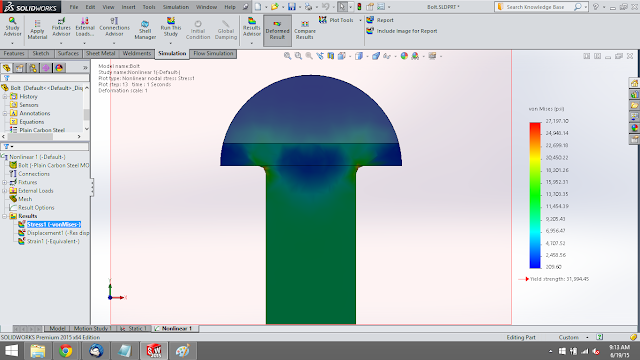Case Study: Bolt Fracture
Hardware
such as bolts, nuts and washers are generally used for connections and
fixtures. They form an integral part of
the component structural integrity.
Bolts are governed by standards such as ASTM and are typically stamped
with an identifying marking on the head during the manufacturing process. The bolts selected for any application
typically take into account the manner in which it is applied while taking into
account the most prevalent mode of failure.
It follows that it would be in the designer’s best interest to
understand how bolts fail and to avoid those situations.
Roundhead
Bolt 12mm DIA x 152MM LONG ASTM A307
It is worth
noting that the tensile strength for that grade of bolt is approximately 60,000
PSI. Therefore, using plain carbon steel
as a template, the tensile strength was adjusted accordingly.
Next, we can
set up a test scenario using SolidWorks Simulation where the bolt is fixed at
the top with a base tensile load of 10,000 PSI applied at the bottom
We can now
mesh the bolt
After
running the Static analysis we can do a section plot to understand how the
stress a distributed in the cross section of the bolt. We find that the highest point of stress concentration
occurs at the neck as expected with a value of 28,067 PSI.
Note
that this value is fairly close to yield strength of the material 31,994
PSI. If a stress value approaches the
yield strength, the general assumption of linear behavior of the material
begins to breakdown. Therefore it is in
our best interest to run a non-linear analysis as well.
Creating a
new non-linear study and running a similar analysis we find that the actual
stress is approximately 27,197 PSI. This value is less than the linear analysis
but it is still close to yield.
Given these
results it would be in the designer’s best interest to either reduce the load,
increase the bolt diameter or chose a higher grade bolt.
Sometimes
bolt failure can occur due to other circumstances as well. Specifications such as how much a bolt must
be tensioned at installation can make a difference. In other cases large batches can yield bolts
with manufacturing defects which may fail below the yield stress.







No comments:
Post a Comment